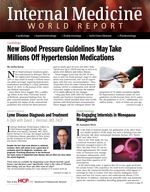Testosterone Treatment Raises Risk of Non-fatal Myocardial Infarction in Older Men
Initiating testosterone therapy in healthy older men substantially increases their risk of myocardial infarction, according to a cohort study published in PLOS One.

Initiating testosterone (T) therapy in healthy older men substantially increases their risk of myocardial infarction (MI), according to a cohort study published in PLOS One.
In light of recent studies that raised concerns regarding adverse cardiovascular (CV) outcomes linked to T treatment, William D. Finkle, PhD, of Consolidated Research, Inc., in Los Angeles, CA, and researchers from the National Cancer Institute and UCLA set out to evaluate the risk of acute non-fatal MI following an initial T prescription.
To do so, the investigators selected 55,593 men from a large healthcare insurance claims database who filled a first prescription for T formulations not containing estrogen — the most common of which were topical gel, cypionate injection, and transdermal patch — and then compared them to 167,279 men who filled an original prescription for sildenafil or tadalafil, given the phosphodiesterase type 5 inhibitors (PDE5Is) are “commonly prescribed to older men, do not have androgenic effects, and … the drugs themselves, after extensive scrutiny, have not been associated with adverse CV events.”
After they filled an initial T prescription, the men were followed until they received a diagnosis for acute non-fatal MI, refilled their original prescriptions, or 90 days passed —an interval the authors chose based on previous research which “indicated CV events appeared early in T treatment.” For those who did not refill their prescription, the researchers analyzed an additional post-prescription follow-up interval of 91-180 days.
At the conclusion of the study, those aged ≥65 years had a “2-fold increase in the risk of MI in the 90 days after filling an initial T prescription … regardless of cardiovascular disease (CVD) history.” Although that risk declined to baseline in the 91- to 180-day follow-up period among those who did not refill their first T prescription, the authors noted “it is likely that there was little use of the medication in (that) interval when the risk declined; thus, the pattern of change in risk by supply of T is consistent with an effect of the drug.”
According to the investigators, that finding “underscores the concerns raised by recent studies in predominantly older men,” including one meta-analysis of placebo-controlled trials in mainly older men with hypogonadism, which “reported that T therapy increased the risk of serious adverse CV-related events,” including MI.
“Given the rapidly increasing use of T treatment, the current results, along with other recent findings, emphasize the urgency of the previous call for clinical trials adequately powered to assess the range of benefits and risks suggested for such therapy,” the authors concluded. “Until that time, clinicians might be well advised to include serious CV events in their discussions with patients of potential risks.”
In response to those conclusions, the US Food and Drug Administration (FDA) is currently reassessing the CV safety profiles of T products and advising healthcare professionals to “consider whether the benefits of FDA-approved T treatment is likely to exceed the potential risk.”
Nevertheless, the study authors acknowledged that their research “had limitations related to use of a healthcare database that did not include information on the serologic or diagnostic indications for treatment, (and) identified only subjects with non-fatal MIs, typically representing about 75% of the total incidence, and was based on the diagnosis of an attending physician, rather than a structured evaluation as might occur in a randomized trial.”
Thus, they admitted, “further study is needed to examine the risk of a variety of specific serious adverse CV events in relation to T dose and duration, and to assess if the risks of T vary by level of serum T and presence or absence of hypogonadal disease.”
